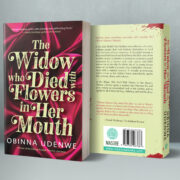
Timendu Aghahowa’s The Bishop’s Prodigal Daughter is a literary work that immerses readers in the enchanting setting of the fictional island of Pakurumo, in Bayelsa State. With remarkable storytelling prowess, the author seamlessly transforms the essence of classic Nollywood drama into prose, creating a narrative that resonates with readers emotionally.
The central plot of this book draws parallels with the timeless biblical tale of the prodigal son, now reimagined through the character of Elo, the prodigal daughter. Elo’s unexpected return home for her best friend’s wedding sets the stage for a whirlwind of drama and romance that she could never have foreseen. Having fled from her family and past to seek refuge in the bustling city of Lagos for years, Elo is lured back to her island hometown for the wedding festivities. Her initial plan was straightforward: attend the wedding and discreetly leave the island behind. However, fate takes an unforeseen turn when her mother, the Archbishop, suffers a heart attack. In an unplanned twist of events, Elo is offered a deal–stay back and run the church for a three-month period, and in return, her mother promises to reward her. Reluctantly, Elo acquiesces, setting in motion a series of events that challenge her deepest beliefs and convictions.

Character development is a significant strength of this book. Elo’s journey from her initial fiery and stubborn self to a more mature and forgiving individual is a testament to the author’s ability to breathe life into her characters. Readers are bound to witness the complexities of human nature and the transformative power of time and experience.
The cast of characters that populate this story reflects the Nigerian society, particularly within the church environment. Deaconess Adomi evolves from an overzealous and proud figure into a character who fights for Elo, highlighting the multifaceted nature of human relationships. Elder Ighomurai embodies the archetype of the elderly figure who believes he understands God’s ways better than anyone else, and his character evolution adds depth to the plot.
Elo’s younger sister, Zino, elicits empathy, her reactions stemming not from jealousy but from a profound sense of abandonment. Her resentment is entirely understandable, considering Elo’s sudden return and her ability to captivate the family as though the past five years never happened. The language used in the book flows seamlessly, ensuring that readers can navigate the narrative effortlessly without the need to reach for a dictionary. The story’s linear progression is a well-crafted aspect of the novel, making it accessible to a broad range of readers without fear of getting lost in the plot.
One noteworthy element is the character arc of the Kiahs. However, one may ponder why they didn’t take a more proactive approach to clarify matters with the Archbishop. While it’s undeniably challenging to convey the truth of her husband’s theft and suicide to a grieving widow, this aspect of the plot could have been explored in more depth. The blossoming Christian romance between Datonye and Elo forms the heart of the story. Elo’s portrayal as a “prodigal” who doesn’t suddenly transform into a “pure” character adds layers of complexity to her persona. Datonye’s unwavering dedication to his faith feels authentic and genuine, and their relationship adds a beautiful layer of depth to the book.
In essence, The Bishop’s Prodigal Daughter resonates deeply with church-going Nigerians, touching on themes that mirror the experiences of the average Nigerian within a church community. The novel serves as a reminder that pastors, despite their spiritual roles, are also human and susceptible to their own struggles and doubts.
While the narrative may be easily predictable, it remains a thoroughly enjoyable read on a cool Sunday evening. Timendu Aghahowa demonstrates adept storytelling in crafting a story that delves into themes of forgiveness, familial dynamics, and love against the backdrop of church drama. The book leaves a lasting impression as a testament to the enduring resilience of the human spirit and the power of love and faith to bridge divides and heal wounds.
